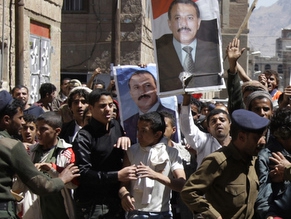|
World Jewish News

Policemen push back government backers during clashes with anti-government protesters in Sanaa February 15, 2011. REUTERS/Khaled Abdullah
|
Yemen protesters clash, police unable to regain calm
16.02.2011, Israel and the World Government loyalists wielding batons and daggers clashed with anti-government protesters in the Yemeni capital on Wednesday as unrest inspired by Egypt's uprising spiraled out of police control.
Police were unable to keep the two sides apart as protesters gathered for a demonstration at Sanaa University to demand the resignation of President Ali Abdullah Saleh, a U.S. ally against al-Qaida who has ruled the impoverished Arabian Peninsula state for more than 30 years.
Hundreds of Saleh backers charged at protesters, who quickly fled. One student was wounded, a Reuters reporter said. A few hundred more student demonstrators emerged from inside the university to try and restart the rally. When police locked them inside the campus, they began throwing rocks at the government loyalists from the campus gate.
"We'll keep protesting until this regime leaves," said Murad Mohammed, a Yemeni university student at the disrupted protest. "We have no future under current conditions."
Hundreds of anti-government demonstrators clashed with supporters of Yemen's president on Monday south of the capital, with both sides hurling rocks as protests escalated in the impoverished Arabian Peninsula state. The protests have turned to clashes in the last week, with rival groups beating each other with batons and fists.
Recent protests have been smaller than in preceding weeks, when tens of thousands of demonstrators took to the streets. But they are erupting more spontaneously and violently, and have become more strident in calling for Saleh's resignation.
The threat of turmoil in Yemen, which is struggling to quash a resurgent wing of al-Qaida and keep rebellions at bay in its north and south, pushed Saleh to promise to step down in 2013 and offer dialogue with the opposition.
The opposition coalition has agreed to negotiate with Saleh, but many young protesters are getting frustrated. "We want change and we want to make that change the way the Egyptians and Tunisians did," said Meshaal Sultan, a Sanaa University student, referring to the revolts that ousted the presidents of Egypt and Tunisia over the last month.
Analysts have said protests are reaching a turning point because they are becoming more spontaneous and youth-led, instead of run by the opposition. The latter works within Yemen's exisiting political framework and has called for reform, and not the resignation of the government.
Many say any uprising in Yemen would unfold slowly and with more bloodshed, in a country where one in two people own guns.
"It's an escalation, but this country is armed to the teeth. When people get fed up enough that they escalate it to sticks, the next step is probably Molotov cocktails, then weapons," said Theodore Karasik, a security analyst at the Dubai-based INEGMA group. "We're getting close to a tipping point."
Saleh on Sunday cancelled a trip to Washington planned for later in the month, which the state news agency said was due to regional conditions, a move that appeared to show his growing concern over unrest in Yemen. On Tuesday Saba news reported that Saleh would open his office to Yemenis who wanted to come air their grievances.
But in another sign dissent may be increasing, the leader of a northern Shi'ite rebel group Abdel Malek al-Houthi issued a statement encouraging Yemeni protesters.
"The Yemeni people should take advantage of the current opportunity and create serious mobilization ... which will be responsible for changing this reality and getting rid of this criminal government," said Houthi, whose followers have a shaky truce with Saleh's government and complain of discrimination.
Analysts have said protests could become more threatening to Saleh if they draw in southern secessionists or northern rebels, whose war with the government last year briefly drew in neighboring oil exporter Saudi Arabia.
Southern separatists, who complain of economic and social discrimination from the northern-led government, have also tried to run protests, though police have swiftly crushed them.
Of the 23 million people in Yemen, often close to collapsing into a failed state, 40 percent live on less than $2 a day and a third suffer from chronic hunger.
Haaretz.com
|
|
